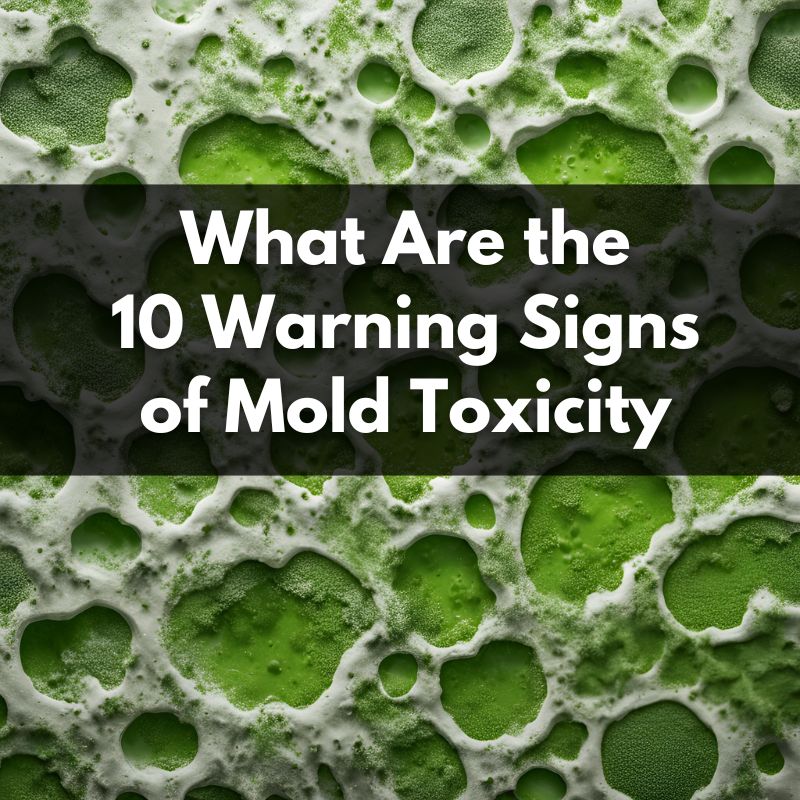
10 Warning Signs of Mold Toxicity
Mold toxicity, also known as mold poisoning, can have a serious impact on health. Mold produces allergens, irritants, and mycotoxins that can cause various health issues, particularly when exposure is prolonged. Identifying the signs of mold toxicity is crucial for seeking timely treatment and addressing the source of the mold. Here are ten warning signs of mold toxicity:
1. Respiratory Issues
Exposure to mold can cause respiratory problems, especially in individuals with preexisting conditions like asthma or allergies. Symptoms may include:
- Persistent coughing
- Wheezing
- Shortness of breath
- Nasal congestion
2. Allergic Reactions
Mold can trigger allergic reactions, which might manifest as:
- Sneezing
- Itchy or watery eyes
- Runny or stuffy nose
- Skin rashes or hives
3. Chronic Fatigue
Feeling unusually tired or fatigued can be a sign of mold toxicity. Chronic fatigue may not be relieved by rest and can affect daily functioning.
4. Headaches and Migraines
Frequent headaches or migraines, particularly if they are persistent and severe, can be a symptom of mold exposure. These headaches are often accompanied by other symptoms like dizziness or light sensitivity.
5. Cognitive Issues
Mold toxicity can affect brain function, leading to cognitive issues such as:
- Difficulty concentrating
- Memory problems
- Confusion
- Mental fog
6. Digestive Problems
Mold exposure can cause gastrointestinal issues, including:
- Nausea
- Vomiting
- Diarrhea
- Abdominal pain
7. Muscle and Joint Pain
Unexplained muscle and joint pain or stiffness can sometimes be linked to mold toxicity. These symptoms may resemble conditions like fibromyalgia.
8. Skin Irritations
Mold exposure can lead to various skin problems, such as:
- Itchy skin
- Rashes
- Eczema
- Dermatitis
9. Sinus Infections
Frequent or chronic sinus infections can be a sign of mold exposure. Symptoms may include:
- Sinus pressure
- Headache
- Nasal discharge
- Post-nasal drip
10. Mood Swings and Depression
Exposure to mold can affect mental health, leading to mood swings, irritability, and even depression. Individuals may experience increased anxiety, sadness, or changes in behavior.
What to Do If You Suspect Mold Toxicity
**1. Seek Medical Advice: If you suspect mold toxicity, consult a healthcare professional for a thorough evaluation. They can conduct tests to determine if mold exposure is affecting your health and recommend appropriate treatment.
**2. Identify and Address the Source: Find and address the source of mold in your home or workplace. This may involve cleaning, removing contaminated materials, and repairing leaks or moisture issues.
**3. Improve Indoor Air Quality: Ensure proper ventilation and use air purifiers to reduce mold spores in the air. Keep indoor humidity levels below 60% to discourage mold growth.
**4. Follow Treatment Recommendations: Follow your healthcare provider’s recommendations for treatment and management of mold toxicity. This may include medications, lifestyle changes, or other therapies.
**5. Consider Professional Mold Remediation: If mold is widespread or severe, professional mold remediation services may be necessary to safely and effectively remove mold from your environment.
Conclusion
Recognizing the warning signs of mold toxicity is essential for protecting your health and well-being. If you experience any of these symptoms and suspect mold exposure, seek medical advice and take steps to address and eliminate the mold source. For more information on health and safety topics, visit News Gutter, where you can find valuable insights and tips for maintaining a healthy living environment.
